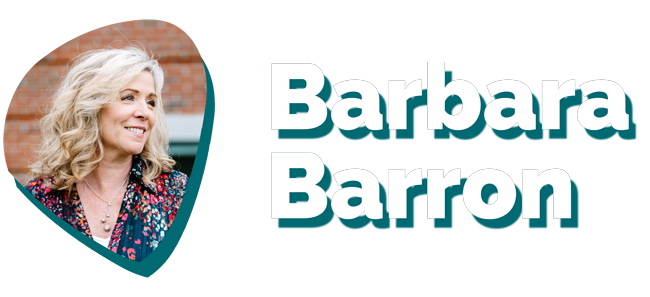by Barbara Barron | Posted February 16th, 2022 | Subscribe to this newsletter

Ever find yourself hearing three or four interconnected thoughts in the same few minutes? Or days?
For me, that’s when I know something is afoot. It signals that I need to slow down, think deeply, and then write about that confluence. Here it is.
Thing one is that I have recently learned of two very seasoned and successful directors of development who are considering leaving their current organizations. Both have raised boatloads of money and are trusted and respected in their communities. One is looking for a new challenge after many years. But looking elsewhere rather than within. (More on that in a minute.) The other is facing a wall of insurmountable resistance. From above. The writing is very clearly all over that particular wall. Sadly, it’s time to move on. The organizations that these two fine professionals serve are about to face something that is decidedly… not good.
Thing two is that I was just reading Donna Orem, NAIS President’s recent “Looking Ahead” column. She forecasts trends in giving and also references the real issue of burnout in the advancement realm. One of the links is to yet another Chronicle of Philanthropy study about the high cost of losing experienced fundraisers. Again? Still? Augh.
I’ve presented on this topic at CASE-NAIS and have written about it here. When we lose someone our donors know and trust, someone with deep and contextual institutional memory and great standing in our community, we not only lose them as trusted advisors. According to the Chronicle piece, we are letting (potentially) hundreds of thousands of dollars in future major gifts walk out the door. This should make Heads and Board members weak in the knees, as it will likely take months or years for someone new to amass the kind of social power and philanthropic influence to secure those significant gifts.
If they ever do.
Meanwhile, some of your best donor family prospects will have moved on in the interim. Perhaps reading that might also empower some of the under-paid and under-appreciated development pros reading this to speak up and advocate for yourselves. Check out this calculator so you can apply the math.
Your salary, my friends, is a mere fraction of your potential worth to your school. Don’t forget that!
Have you subscribed to the newsletter yet? It only takes a minute.
What is missing from the discussion is how to solve this very real problem. Let’s go back to my first example above, where our development professional has decided that it’s time to seek other challenges (read: opportunities) elsewhere. One of the chief reasons that pros give for moving on is the desire to stretch professionally. To gain proficiency in a new area. Professional growth, folks. Everyone worth their salt needs it to continue to thrive.
So in this situation, what if, instead, they first had a frank discussion with their Head about ways to leverage their years of experience and relationships to forge a new, robust major gifts program? If my friend were to have that opportunity at their current school, perhaps a year or two from now, they might have built a rocking major gifts program, helping the school see transformative gifts as a result of those cultivated relationships. If they move on, they may still affect that kind of abundance at a new place. But statistically, it won’t be for several years, as they won’t immediately enjoy those relationships with the new people. See my point?
In the second situation, classic and systemic problems are at work. Leadership thinks it knows everything. People are reduced to working in silos. Diverse perspectives are not brought to bear on problem-solving so they keep trying the same solutions to evolving problems. As educational organizations, we love to talk about advocacy, letting students try and fail, and the power of iteration. But those values often stop at the classroom door.
An old professional friend once told me that we can only ever go as far as our leaders can see for us. Sad and true. That’s exactly what’s happening here. A complicating factor for schools is that the market is extremely tight. So both schools will likely have to pay far more for far less to hire my friends’ successors. Even if they find someone excellent – and I hope they do! – they are months or years away from yielding the possible results they could have achieved if they’d allowed my friends to do the extraordinary work they have shown they can do. Senseless.
In closing, I do have to say that, despite everything I’ve said here, moving on is sometimes still the best possible decision. For everyone. I have long believed that the right thing for the individual is ultimately the right thing for the organization. Even if it doesn’t initially feel like that. But to my Heads and volunteer readers: isn’t it worth trying to create an atmosphere where you keep great people a bit longer? To recognize and reward worth and contribution? To allow for growth and experimentation, especially if it results in increased revenue and more connected, loyal donors?
And for those of you who are too burned out or itchy to even try to create a better situation where you are, I leave you with this advice.
We all know the expression “To live well is the best revenge.” I would add this little corollary: “If true, then the second-best revenge is to leave a high watermark.” Do extraordinary work. Be impeccable. Leave behind a legacy of work and quality that sets an impressive bar. It serves your organization to know what great looks like. Let’s see them try to replicate it.
Be well,
Barbara Barron

My name is Barbara Barron, and I’m writing this blog to share advice on a profession that I adore.
I’ve been working in the field of Independent School Advancement for over 20 years. In that time, I’ve had the pleasure of creating and implementing successful fundraising plans and programs for so many incredible schools. I’ve had the privilege of seeing real growth at The Carey School, Marin Primary & Middle School, Woodside Priory, Crystal Springs, Presidio Knolls, Sage Ridge, and San Diego French American, and others. (Maybe we’ve met!)
Nothing makes me happier than seeing a struggling school start to thrive. My hope is that you’re here to make a positive change as well. I hope my advice can be a part of that change.
Shoot me an e-mail if you want to swap tips, or share your voice here.
Let’s do this, together.







